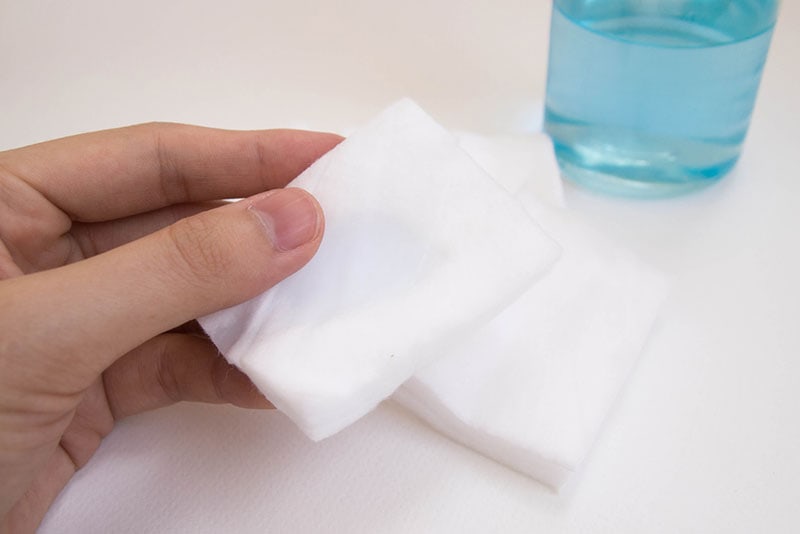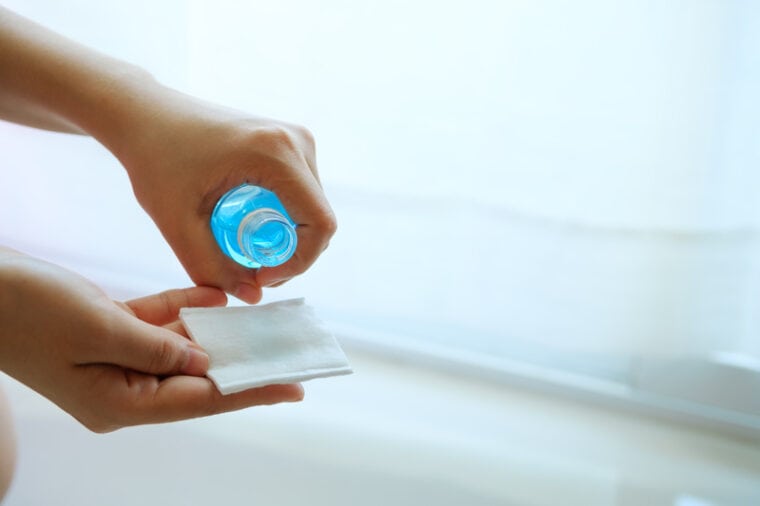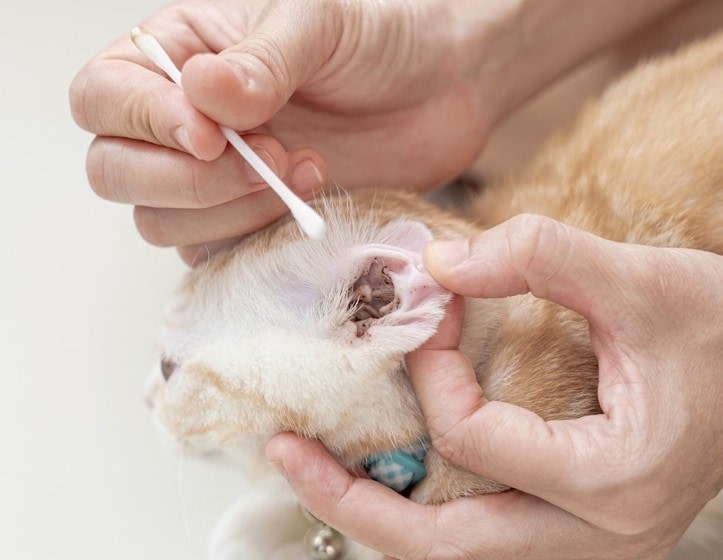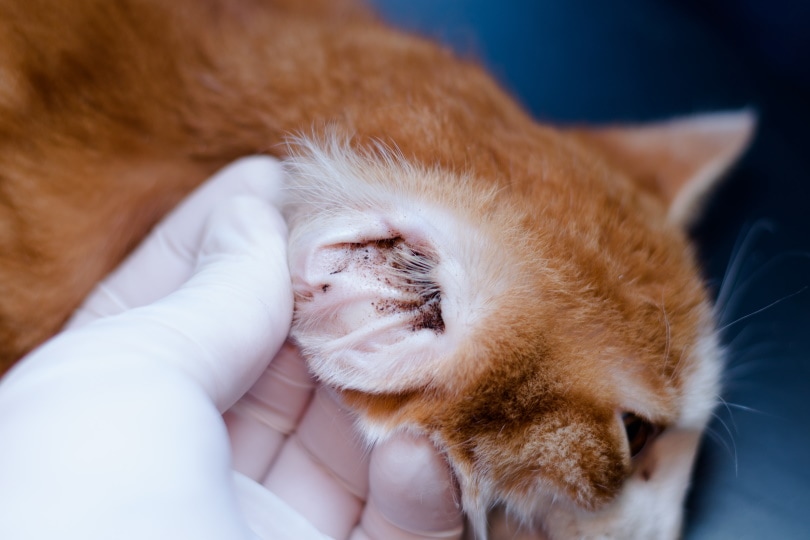- March 14, 2024
Will Rubbing Alcohol Kill Ear Mites in Cats? Vet-Reviewed Explanation



The information is current and up-to-date in accordance with the latest veterinarian research.
Mites aren’t just a pesky and irritating problem for us—they’re also a real nuisance for our feline friends! Indeed, these tiny parasites love to lodge comfortably in a cat’s ears and can cause intense itching leading to possible infections if they are not removed.
Still, that’s no reason to use just any homemade treatment to rid your cat of these undesirables. Take rubbing alcohol, for example. Although this household product can do wonders for disinfecting small external wounds in humans, it should never be applied to the skin of your four-legged friend.
Read on to find out exactly why it’s not a good idea to use rubbing alcohol to fight ear mites in cats and what treatments vets recommend instead.

What Are Ear Mites?
So, what exactly are mites, and why do they like your cat’s ears so much? In short, ear mites (Otodectes cynotis) are tiny arachnids barely visible to the naked eye. With the naked eye, they can be seen as white specks moving around the external and inner ear.
They are highly contagious and can be easily transmitted from one animal (including cats, dogs, rabbits, and ferrets) to another through close contact. These external parasites thrive in the warm, moist environment of the ear canal, as it’s an ideal breeding ground.
Ear mites feed on the wax and oils in your cat’s ear, which can lead to a range of unpleasant side effects. Common signs of infestations include:
- Dark, “coffee ground” discharge in the ear
- Areas of hair loss due to scratching
- Excessive scratching and/or grooming
- Head shaking
- Foul odor due to the accumulation of mites’ debris
- Crusted rash around or in the ear
- Inflammation of the external ear canal
- Presence of pus in the ear canal

Why Rubbing Alcohol Should Not Be Used to Kill Ear Mites in Cats
Now that you know a bit more about these tiny pests, let’s talk about the problem of using rubbing alcohol to annihilate them.
PetMD has rubbing alcohol (also known as isopropyl alcohol) on its list of potentially harmful cleaning products for pets. If this antiseptic product is used inappropriately (on open wounds, for example), it can cause skin lesions and even delay wound healing.
So, while isopropyl alcohol may kill certain types of mites and insects upon contact, using it in your cat’s ears isn’t a safe solution. Here are a few other reasons:
- Irritation. Alcohol can be harsh to the delicate skin of the ear canal, especially if it is inflamed or ulcerated. A cat with an infestation of ear mites will most likely have caused some trauma to its ear through scratching, so alcohol on an open wound will be extremely painful.
- Limited penetration. Ear mites often burrow deep into the ear canal, where it can be challenging for rubbing alcohol to reach them effectively.
- Not a permanent solution. Even if rubbing alcohol manages to kill a few mites on the surface, it may not eliminate the entire infestation, leaving the problem unresolved.
- Risk of injuring your cat. When attempting to clean your cat’s ears with rubbing alcohol, there’s a risk of injury if your cat resists, squirms, or jerks their head suddenly. You could inadvertently damage the sensitive ear canal or eardrum.
Instead of relying on rubbing alcohol, it’s best to consult with your veterinarian for a more effective and safer treatment plan.

What Veterinarians Recommend
If you’re dealing with an ear mite infestation in your cat, a trip to the vet is in order. They will provide a comprehensive treatment plan once they have diagnosed that ear mites are the cause of the problem and ensured your cat’s ear drum is in-tact. The treatment plan may include the following steps:
- Gentle ear cleaning. Your veterinarian will clean your cat’s ears (with an ear friendly, non-caustic ear cleaner) to remove the crumbly discharge and debris produced by ear mites. They will likely provide you with a cat-safe ear cleaner specifically designed for this purpose so you can continue the treatment at home if needed.
- Prescription medications. Your vet will prescribe a spot-on anti-parasitic medication that is effective at killing Otodectes cyanosis and/or a topical medication or injection to kill ear mites and manage any secondary infections. These medications are much more effective and safer than using rubbing alcohol. Systemic anti-parasitics also stop the re-infestation of ear mites for a certain period of time (depending on the product used).
In addition, your veterinarian may want to re-examine your cat 1-2 weeks later to ensure that the mites have been eradicated or determine if another treatment is required.

Tips for Keeping Your Cat’s Ears Healthy
As the saying goes, prevention is better than cure! If you don’t want to face another ear mite infestation, you must take preventative measures to keep your cat’s ears clean and healthy:
- Keep up with regular parasite prevention treatments, these are usually monthly spot-ons or tablets.
- Include ear checks as part of your cat’s grooming routine. Look for any signs of ear mites, wax buildup, or unusual discharge. If you notice any changes, promptly book an appointment with your vet.
- Schedule routine vet check-ups to catch any ear mite infestations early.
- Regularly clean and disinfect your cat’s living space, including bedding, toys, and litter boxes, to minimize the risk of re-infestation.
Important: When you bring a new cat into your home, it is important to quarantine them from any existing cats you may have. This initial isolation can help prevent the spread of ear mites and other contagious diseases. These parasites are highly contagious through close contact so keep your new cat separated until they have received their monthly anti-parasite treatment.

Final Thoughts
While the idea of using rubbing alcohol to kill mites on your beloved cat may seem tempting, it can actually irritate your poor pet’s ears, leading to more pain, more irritation and an increased risk of infection. It is not an effective solution. This is why it’s always better to consult your vet for anti-parasitic products or other safe medications that are appropriate for your cat. By following these guidelines and working closely with your veterinary professional, you can ensure that your kitty’s ears stay mite free!
Featured Image Credit: tong patong, Shutterstock
Tags
What do you think?
Related Articles

New Puppy Checklist: Gear You’ll Need for Your New Dog
Getting a new puppy is really exciting, but before you welcome them home, it’s important to prepare your space for them. Since puppies need a

How Big Do Mini Poodles Get? Vet Reviewed Average Weight & Growth Chart – Dogster
The information is current and up-to-date in accordance with the latest veterinarian research. Learn more » When you buy a Miniature Poodle, you might not

Can Police Dogs Smell Nicotine? Vet Verified Facts & Info – Dogster
The information is current and up-to-date in accordance with the latest veterinarian research. Learn more » While cigarette sales have been declining steadily for decades,

How Old Is 5 in Dog Years? Vet-Approved Guide to Each Size of Dog – Dogster
The information is current and up-to-date in accordance with the latest veterinarian research. Learn more » A common method for calculating a dog’s age is

